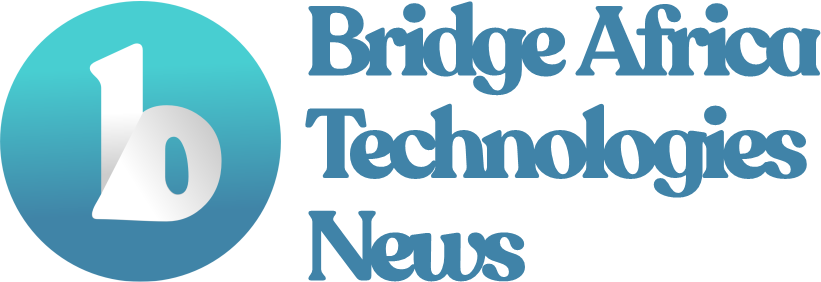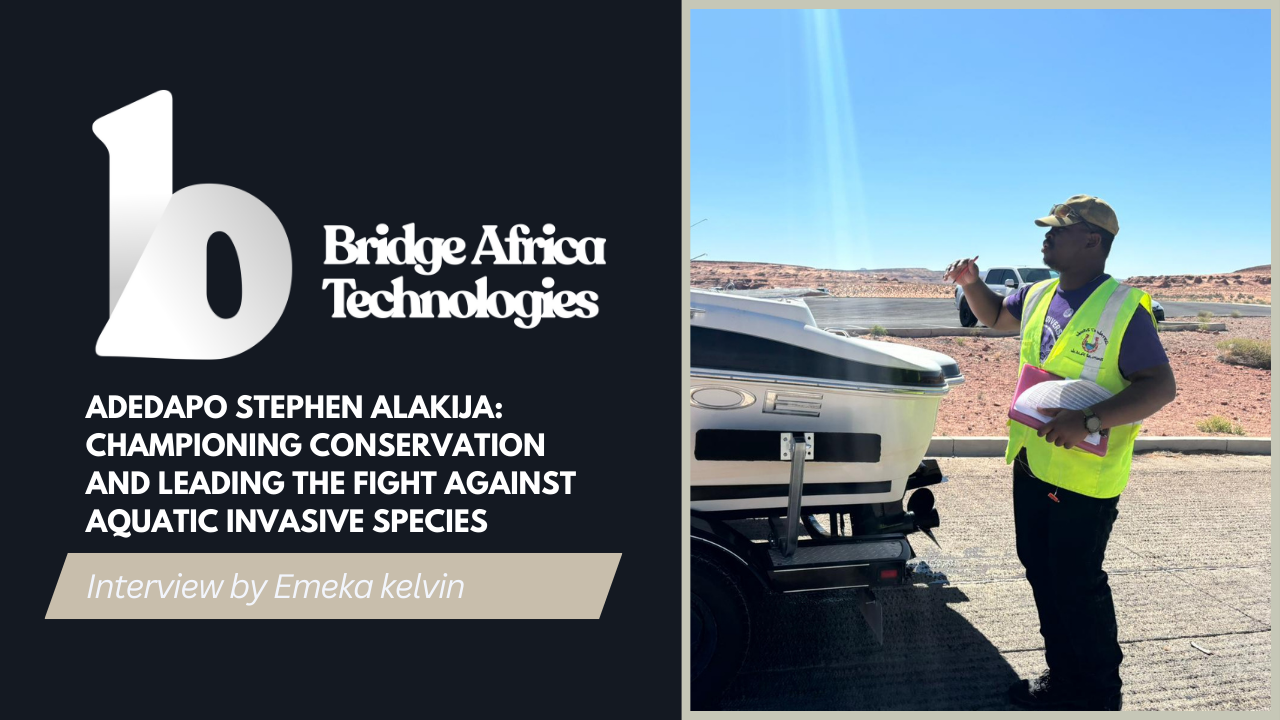“Preserving ecosystems isn’t just a profession—it’s a responsibility that connects us to the future. Every action today shapes the balance of our natural world tomorrow.“— Adedapo Stephen Alakija
Meet Adedapo Stephen Alakija; an experienced and accomplished professional forester and aquatic invasive species specialist with a profound commitment to the growth, development, management, and conservation of flora and fauna in both terrestrial and aquatic environments. Adedapo’s academic foundation is robust, holding a Bachelor’s degree in Forestry and Wildlife Management from Olabisi Onabanjo University and a Master’s degree in Forestry with a specialization in Wildlife Management from Stephen F. Austin State University, Texas, USA.
Throughout his dynamic career, Adedapo has amassed extensive expertise through roles at renowned organizations such as the Minnesota Department of Natural Resources and the Woods to Water Wildlife Solutions. His work has involved critical tasks such as inspecting and decontaminating watercrafts to prevent the spread of invasive species, notably quagga and zebra mussels, conducting wildlife population assessments, and leading public outreach and education on environmental conservation. His unique capabilities include data collection and analysis, the use of advanced GIS tools like ESRI and ArcGIS Pro, and the application of various decontamination methodologies. Adedapo’s leadership extends to training teams in species inspection protocols, ensuring rigorous standards in environmental protection practices.
Adedapo’s field experience is complemented by his adept handling of specialized equipment, including UTVs, ATVs, and automated machinery, which he employs during conservation projects. His comprehensive knowledge of watercraft anatomy has made him an essential figure in mitigating the spread of invasive species across waterbodies. He has conducted public education campaigns to enhance community understanding of environmental impacts, fostering cooperative efforts toward sustainability.
Adedapo’s notable certifications and achievements include significant contributions to chronic wasting disease (CWD) management and impactful fieldwork that underscores his dedication to safeguarding biodiversity. His research projects, such as the spatial analysis distribution of bushbucks in Nigeria and assessing the conservation status of mammals in Texas, have further demonstrated his commitment to advancing scientific knowledge. Recognized for his commitment to excellence, he was honored with the BAT Award of Excellence in 2024, reflecting his standing in the field of natural resource management.
In addition to his professional accomplishments, Adedapo has collaborated with various institutions on conservation initiatives, participating in surveys and fieldwork related to species monitoring and habitat preservation. His affiliations with respected organizations, including Invasivesnet and the International Union for Conservation of Nature (IUCN), showcase his dedication to aligning with global best practices in environmental conservation.
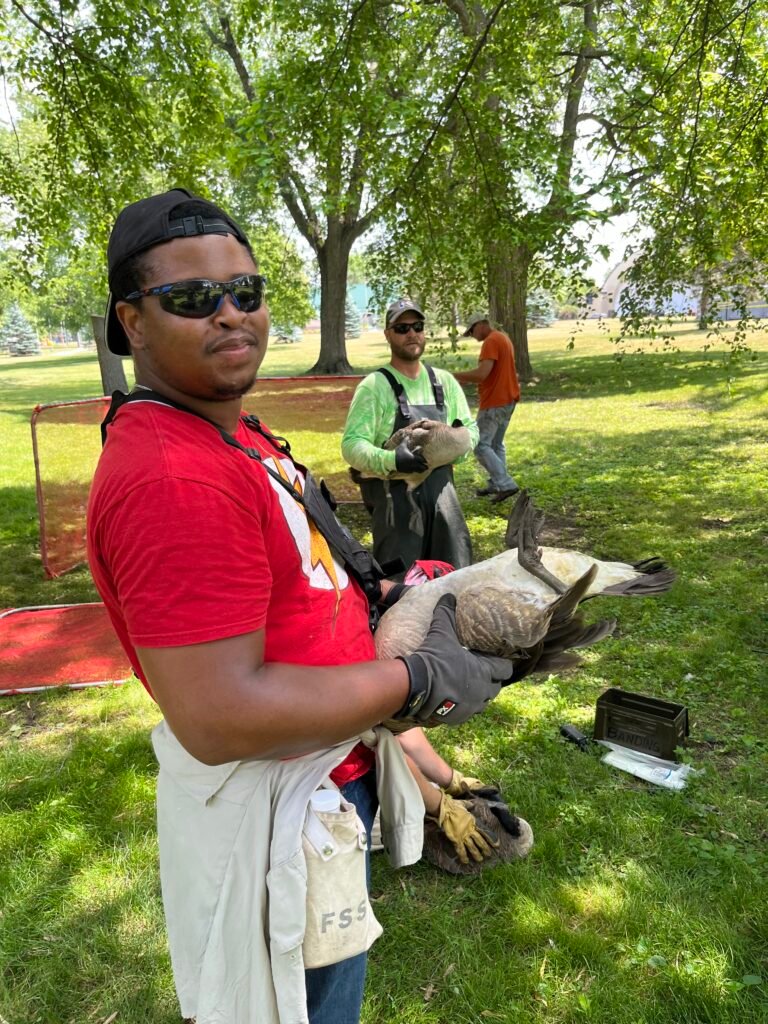
Driven by a vision to foster healthier ecosystems, Adedapo is in the process of establishing an organization dedicated to the prevention and control of aquatic invasive species. Through this initiative, he aims to create a network of specialists who can inspect, decontaminate, and monitor watercrafts nationwide, significantly reducing the risk of invasive species infestations in the US. His future goals include expanding this initiative to make substantial strides in conservation efforts, enhancing public awareness, and reinforcing sustainable practices to preserve native species and support ecological balance.
Adedapo’s unwavering passion, combined with his deep-seated knowledge, notable certifications and field experience, positions him as a valuable advocate and leader in the realm of environmental stewardship. His dedication to nurturing the coexistence of diverse species and ensuring their protection for future generations embodies the essence of his professional journey and commitment to making a lasting impact on the natural world.
In this interview, we explore the career journey, significant achievements, and innovative contributions of Adedapo Stephen Alakija, an accomplished forester and aquatic invasive species specialist, as he shares his journey and the experiences that have shaped his career in environmental conservation. As well as his aspirations as he discusses the path that has led to his impactful work.
Bridge Africa Tech Round Table Talk with Industry sensation— Adedapo Stephen Alakija
1. Can you share your early inspirations and how they influenced your choice to pursue a career in forestry and wildlife management?
Adedapo: Growing up in Ogun State, Nigeria, I was surrounded by a vibrant array of natural landscapes, from dense forests to expansive wildlife reserves, which sparked my fascination with flora and fauna. I vividly remember family trips to conservation areas where I would watch animals in their natural habitats, fueling my curiosity about how ecosystems maintain balance. These experiences ignited a passion that grew stronger as I learned more about the intricate relationships within the natural world. My academic journey at Olabisi Onabanjo University deepened this passion, providing me with the theoretical knowledge and practical exposure I needed to solidify my decision to pursue a lifelong career in conservation and environmental management. It became clear to me that protecting and nurturing these ecosystems was not just an interest but a calling.
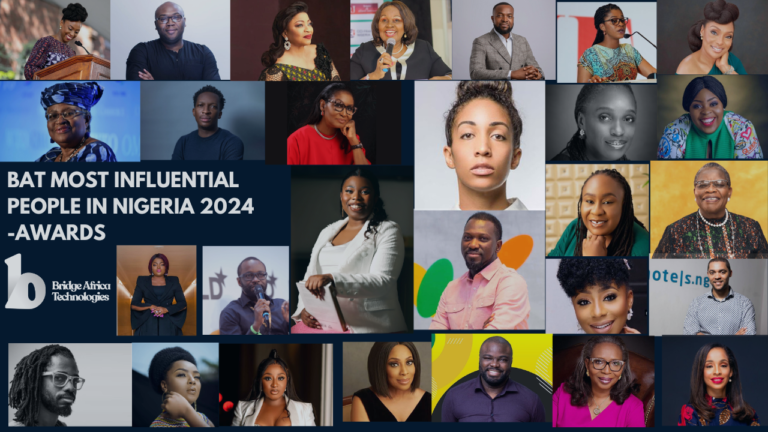
BAT Most Influential People In Nigeria 2024 -Awards
2. What were some of the most significant challenges you faced during your studies and early career, and how did you overcome them?
Adedapo: The transition from academic studies to real-world fieldwork posed significant challenges, especially during my internships at the University of Ibadan Zoo and Old Oyo National Park. Applying theoretical knowledge to practical scenarios was not always straightforward. One particularly demanding experience was learning to handle and manage wildlife in unpredictable situations, which required quick thinking and adaptability. To overcome these challenges, I sought mentorship from seasoned professionals who provided invaluable guidance and shared their practical insights. I also committed myself to continuous learning by taking part in additional training sessions and workshops, working for both private and governmental organizations to boost my experience and area of expertise. This combination of mentorship and proactive self-improvement helped me build the resilience and skill set necessary to excel in the field.
3. Could you detail your most impactful project and what you believe set it apart from others?
Adedapo: One of my most impactful projects was working on the mitigation of aquatic invasive species in the United States, focusing on quagga and zebra mussels. What set this project apart was its multifaceted approach, which involved not only watercraft inspection and decontamination but also comprehensive public education campaigns. Leading teams to inspect watercrafts for invasive species and teaching boat owners about the importance of prevention were crucial components. The success of this project came from combining hands-on fieldwork, advanced data analysis using GIS tools, and outreach efforts that fostered community involvement. The outcome was a significant reduction in the spread of these invasive species and heightened public awareness about the importance of protecting aquatic ecosystems.
4. You’ve worked in various roles within different environmental organizations. How has each role contributed to shaping your professional philosophy?
Adedapo: Each position I have held—whether as a Wildlife Intern at the Minnesota Department of Natural Resources or as a Chronic Wasting Disease Technician or my current role as an Aquatic Invasive Species Specialist with Woods to Water Wildlife Solutions—has added a unique layer to my professional philosophy. For instance, my time as a CWD Technician taught me the value of meticulous data collection and the importance of cross-departmental collaboration. My roles have shown me that adaptability is key in environmental management, as conditions and challenges can shift rapidly. Additionally, I have learned that teamwork and strong communication are essential for effective conservation efforts. These experiences have reinforced my belief that impactful conservation work requires a blend of scientific rigor, community engagement, and adaptable strategies.
5. What are some core competencies that you believe have been crucial to your success as a forester and invasive species specialist?
Adedapo: A few core competencies have been instrumental in my success. First and foremost, my proficiency in data collection and analysis allows me to assess environmental conditions and track the impact of conservation efforts accurately. My expertise with GIS tools such as ESRI and ArcGIS Pro has enabled me to map out invasive species patterns and develop targeted intervention strategies. Another key skill is public communication; being able to engage and educate the community has been vital for building partnerships and promoting sustainable practices. Mechanical proficiency with equipment like UTVs, ATVs, and decontamination machinery is another asset that supports effective field operations. Lastly, my ability to work well both independently and within a team ensures that projects run smoothly and efficiently.
6. Can you share more about the research projects you led or were part of, and their outcomes?
Adedapo: During my graduate studies at Stephen F. Austin State University, I led a research project that assessed the distribution, composition, and conservation status of mammals in Texas. This research provided valuable data that informed local wildlife management strategies and helped shape policy recommendations for habitat conservation. Another significant project during my undergraduate years involved a spatial analysis of bushbuck distribution in Iwofin Forest, Nigeria. This study underscored my dedication to understanding animal behavior and its connection to habitat health. The outcomes of these projects were not only academically enriching but also reinforced my practical approach to conservation, focusing on using data-driven strategies to achieve measurable results.
7. What unique qualities or experiences do you believe differentiate you from others in your field?
Adedapo: My unique combination of international experience, blending conservation practices from both Africa and the United States, sets me apart from many in my field. This dual perspective has equipped me with the flexibility to approach challenges from different angles. My range of expertise—from wildlife rearing and vegetational surveys to advanced techniques in watercraft inspection and decontamination—provides a well-rounded toolkit that few possess. Additionally, my passion for public education and community outreach makes me not just a practitioner but an advocate for awareness. I believe that inspiring others to understand and care about environmental conservation is as important as the fieldwork itself.
8. What motivated you to take on the challenge of founding an organization focused on aquatic invasive species prevention?
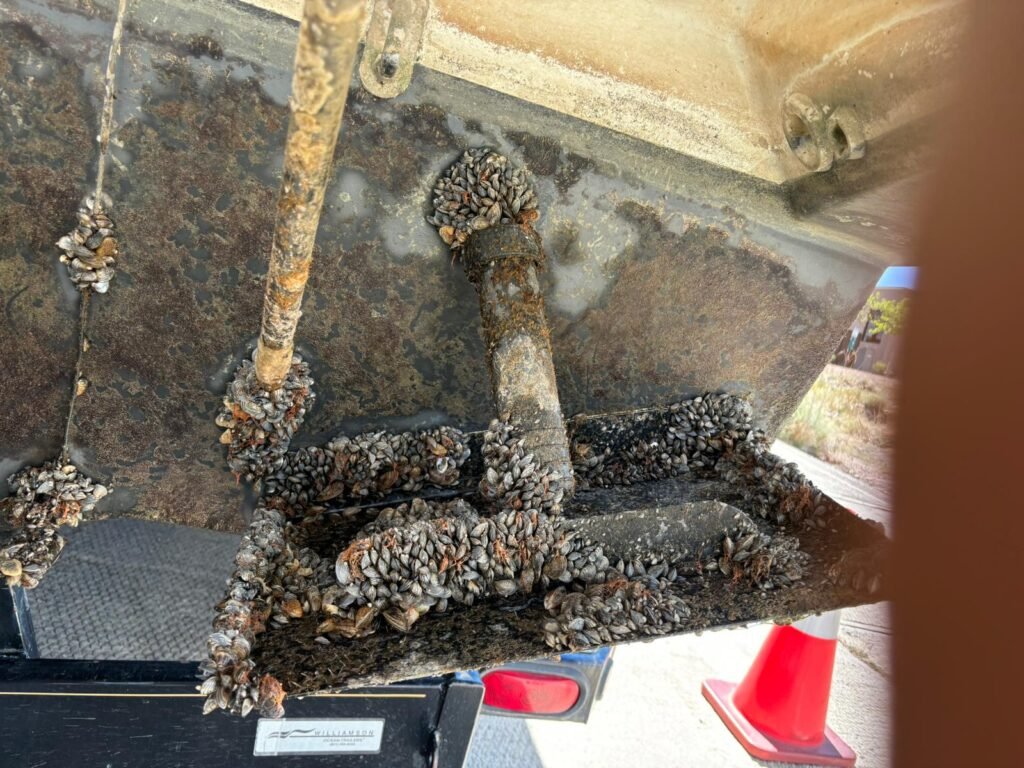
Adedapo: The motivation came from witnessing firsthand the ecological damage invasive species can cause, particularly in aquatic environments. I saw the need for a coordinated, national approach that could tackle this issue on multiple fronts. Founding an organization focused on aquatic invasive species prevention was my way of contributing to a long-term solution. I wanted to create a network where specialists could conduct inspections, decontamination, and public education programs efficiently. By establishing this organization, I aimed to address gaps in current conservation efforts and build a more proactive and preventive strategy for protecting water bodies.
9. How do you approach public communication and education on environmental issues, and why do you think it’s essential?
Adedapo: Public communication and education are essential components of successful conservation work. I approach these aspects with the belief that people are more likely to protect what they understand and value. I have led outreach programs where I engaged with local communities, providing clear, relatable information about the impacts of invasive species and the steps they can take to help. One memorable experience was conducting workshops that taught watercraft owners how to identify and report invasive species. These efforts not only raised awareness but also fostered a sense of shared responsibility. Effective communication bridges the gap between scientific research and public action, making it an indispensable part of my work.
10. What does receiving the BAT Award of Excellence in 2024 mean to you, and how has it impacted your career?
Adedapo: Receiving the BAT Award of Excellence in 2024 was an incredible honor and a milestone in my career. It was more than just recognition; it validated years of hard work, dedication, and the impact I’ve had in the field of environmental conservation. This award has elevated my professional profile, allowing me to connect with other experts and expand collaborative opportunities. It reinforced my commitment to my conservation goals and inspired me to take on new challenges with even greater passion. The recognition has also given me a platform to share my experiences and advocate for broader environmental initiatives.
11. Can you describe how technology and data analysis play a role in your current conservation strategies?
Adedapo: Technology and data analysis are integral to my current conservation strategies. I use GIS software and data collection tools to create detailed maps of invasive species distribution, which help in planning targeted interventions. These technologies enable me to track the spread of species and assess the effectiveness of different management techniques. Data analysis also helps in predicting future trends and identifying high-risk areas that need immediate attention. This precision ensures that our conservation efforts are both efficient and impactful. By leveraging these tools, I can make informed decisions that contribute to sustainable conservation practices.
12. What are your long-term aspirations in the field of environmental conservation?
Adedapo: My long-term aspirations involve expanding the reach of my organization to influence policy and set new standards for watercraft decontamination and invasive species prevention. I envision creating stronger partnerships between public agencies and private stakeholders to implement large-scale conservation projects. Additionally, I aim to develop educational programs that can be integrated into school curriculums to inspire the next generation of environmental stewards. Ultimately, I want to contribute to global conservation efforts, ensuring that our ecosystems are resilient, thriving, and protected for future generations.
Conclusion:
In closing, this conversation with Adedapo Stephen Alakija has shed light on his inspiring journey from the forests of Nigeria to the forefront of global environmental conservation. His unwavering dedication, marked by impactful projects and significant recognitions such as the BAT Award of Excellence, underscores his leadership and profound contributions to the field.
Bridge Africa Technologies has aptly recognized Adedapo as one of the exceptional Nigerians excelling abroad, illustrating the power of resilience, expertise, and a vision driven by purpose. His story is a testament to how one individual’s commitment can inspire positive change, resonate beyond borders, and pave the way for future conservation efforts that benefit both the Nigerian community and the world at large.
